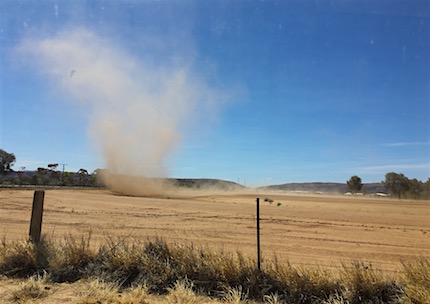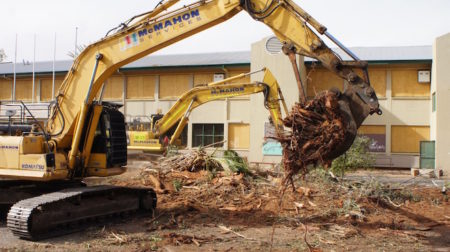Alice Springs News 30 November 2019 – https://www.alicespringsnews.com.au/2019/11/29/land-planning-favours-developers-says-residents-group/
Land planning favours developers, says residents group
The proposed removal of “amenity” would turn the Planning Act into a law even more serving developers rather than the whole community, says Margaret Clinch, campaigner over the last 25 years for a bottom-up approach to land planning in the Territory.
Far from being excluded from the objectives section of the proposed Planning Act, amenity – very generally, the things that make for a better place to live – should be front and centre of every planning decision, she says.
This should apply to all planned areas, industrial as well, not just residential: “It’s a matter of dividing up the land you have for the variety of uses needed, layout, transport, the way it’s good for the people who live and work there, from young marrieds to oldies, right through to high-end apartments in the CBD.
“Trouble is, Minister Eva Lawler keeps changing things suddenly, allowing community purposes land to be sold, granting exceptional development permits and refusing heritage listings.”
Ms Clinch says it’s clear the government wants to use planning to crank up the economy by endorsing applications from developers and creating work for builders at the expense of the lifestyle of people in the neighbourhoods.
And while the government provides a one stop shop where developers “get all sorts of help” – and who in any case have access to legal and other advice – no such in-depth shop is available to ordinary folk making applications or trying to find their way through the maze of regulations and processes.
Official consultations by the NT Planning Commission about new Area Plans which will have effect for many years are often presented by hired consultants who fail to take seriously the important objections of local residents.
Demolition of Anzac Highschoool in Alice Springs.
A meeting in Darwin on Wednesday, attended by 60 people, was an exception: Senior planner Del Batten shared the floor with Ms Clinch from the longstanding community group PLan: the Planning Action Network, Inc.
Ms Batten claimed the Act had been enriched with respect to “amenity”: While the word has been taken out the concept is covered elsewhere in the Act, Ms Clinch reports Ms Batten as saying.
The gathering called by the Planning Action Network Inc (PLAN) presented an extensive list of demands, including no more community purpose land sold to developers, and no ministerial override. They see a role for their network extending beyond Darwin.
For instance, they are very aware of the saga surrounding the current demolition of the former Anzac Hill High School, with no firm plans for the site in place, at least as far as the public knows.
Ms Clinch says projects such as small parks, community purpose land, schools, churches, community and youth centres should not fall by the wayside.
She says there are worrying reports that 50% of the next new development land will be in the Darwin CBD, and the rest in green areas right around the CBD.
In Alice Springs, while there is talk of master planning, the examples continue to abound of ad hoc decision-making for the CBD.
This is complicated by poor relationships between the government and the Town Council. One example is the proposed Kwatja water play area, which council favours being located at Snow Kenna Park, very close to the Anzac site currently being cleared by the NT Government.
How will the water play area mesh with what ultimately goes there? If anyone knows, they are not sharing the information with the community.
“The problem is that there is a top-down approach,” says Ms Clinch.
“The Planning Commission doesn’t hear what the public is saying. Profit, not community needs, is the objective.”

PLAN says in a media release that the Act needs to spell out in full what the Development Consent Authority must consider “so people can see its purpose”.
“Inadequate protection for urban and suburban natural environments”: massive drainage works at Kilgarrif are a good example. Humans suffer too (see their houses in the distance).
Ms Clinch says planning 50 years in advance is absurd, seeming to be a strategy of locking up land based on commercial activity centres that may never happen.
Says PLAN: “Basing the massive changes on strategic planning are counter-productive. The projections are too far into the future to be accurate, and do not have community acceptance.
“There is inadequate provision for local parks, community centres for old and young with a growing population; with inadequate protection for urban and suburban natural environments, animals and birds.
“[We] need integration of social infrastructure for health and to avoid crime. Pathways processes for social infrastructure. are long overdue.
“No more community purpose land sold to developers.
“The public is tired of being hectored again and again over the years and its needs ignored. The community must have equal status with developers,” says PLAN.
“Larger lots are needed for families.”
A spokesman for the group says there should be no let off for abandoned stockpiles, such as rubbish on a part of the Darwin foreshore.
A deep hole in preparation for construction that’s been abandoned for six years whereas the Act requires “making good” if construction doesn’t start within two years.
The old abattoir in Smith Street in Alice Springs may be an example of that problem in Alice Springs.
UPDATE November 30
Margaret Clinch sent this note: The department has extended the time for submissions for another week to Friday, December 6.
Interested people can just send an email to planning.reform@nt.gov.au saying: “Put amenity back into section 2A of the Planning Act. Design for the climate. All applications must be fully advertised in the press. No exceptional development permits. Preserve heritage. No specials.”

